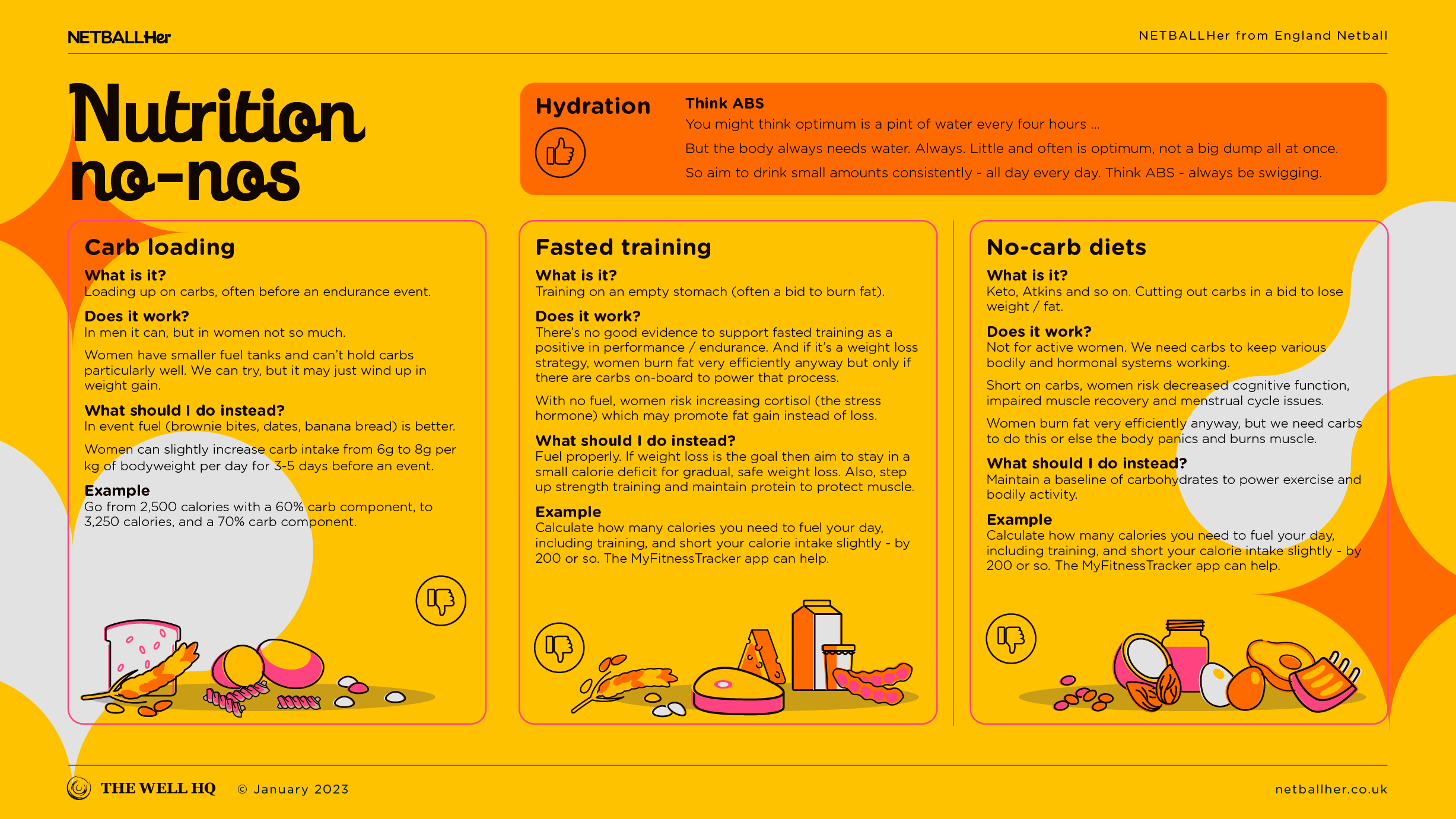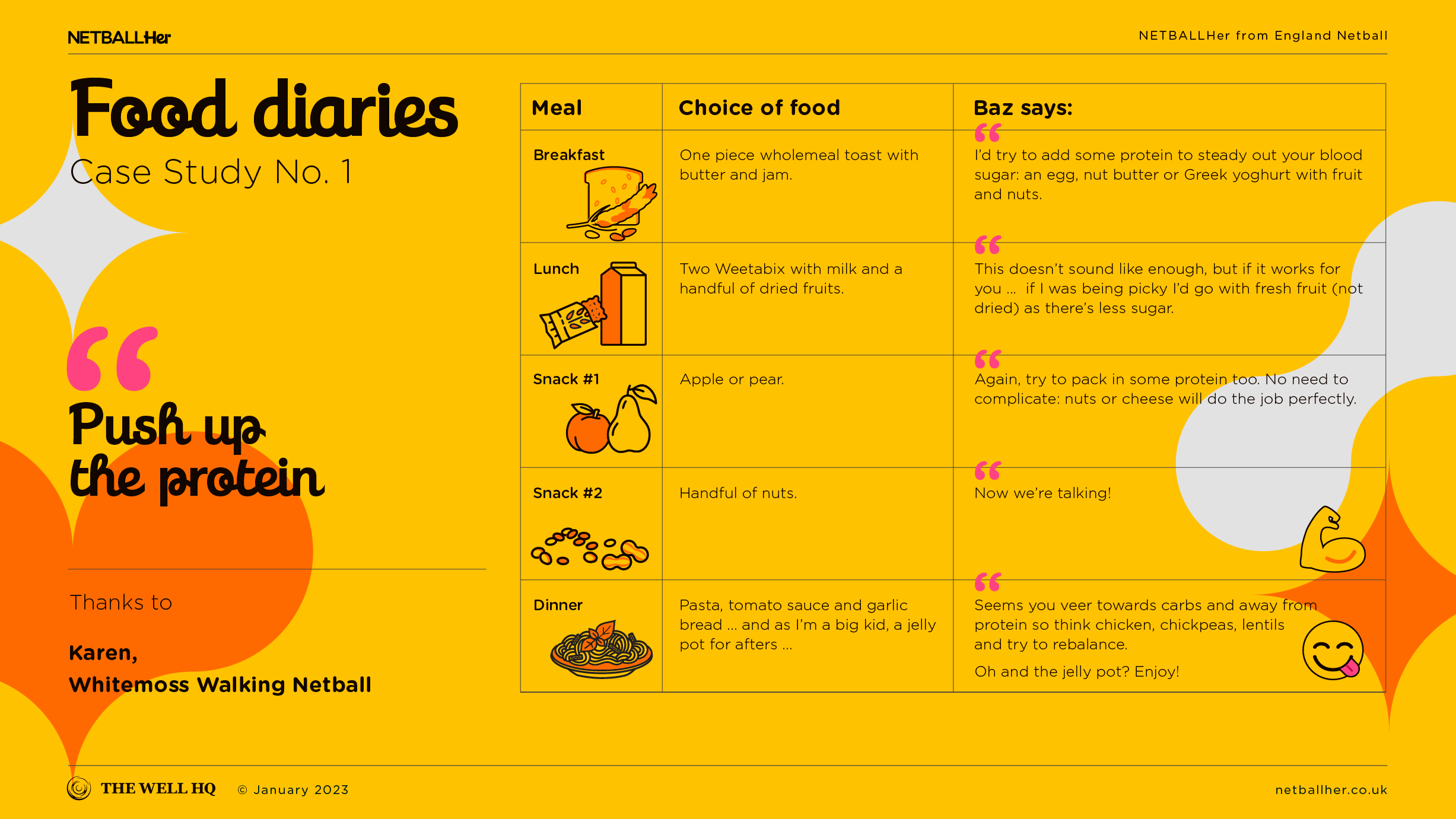Click play for an audio readthrough of this article
Want to control your weight? There’s safe and solid ways to do so, and ways that aren’t so much …
In sport it’s not uncommon for female athletes to want to lose or otherwise control their weight. They may feel their performance is best at a certain weight, or they want to lean out or change body composition. It might just be a self-esteem move.
Whatever the motivation, certain corners of Instagram’ll tell you dieting, even for athletes, is a moist piece of cake. Seductive photos and 10-step-plans might convince you that fasting, Keto, or even pills are the only way to go …
Nope. For athletes, shedding a few pounds and / or limiting calories is a difficult balancing act. You’ve still got to pack in enough of the good stuff to avoid complications, to maintain performance, to protect muscle, to fuel adequately, to optimise health … and to hold onto happiness.
In this article we’ll examine weight control and its pitfalls, before looking at RED-S, Keto and fasted training and rounding off with veggie and vegan diets. Ready?
Healthy weight control
To get one thing straight from the get go: it is not healthy to restrict or deprive yourself of food or to eliminate food groups completely from your diet.
If you’re an active woman who wants to lose or control your bodyweight, you still need to balance your diet via fats, carbs, protein, vitamins and micronutrients.
So the premise for healthy weight control is this: work out how many calories you need to fuel your day, including your training, and track your calorie intake.
If you want to maintain weight then try to hit your target, or at least very close to it.
If you want to lose weight then aim for up to 200 calories short of target and stay in that relatively small deficit until you reach your goal.
Take this approach and your nutrition regime can still comprise foods you enjoy. That’s key because if it’s enjoyable, it’s sustainable. If it’s not then it’s probably not.
Pitfalls of weight control
By and large, athletes are driven people. They’re the kind of driven that’ll get up at 6am in January for a run. But if you put that drive to work in the context of weight loss / control, things can easily go south.
Controlling calories can become somewhat addictive. Losing weight can become incredibly addictive, and it’s easy to get lost in a world of apps and kitchen scales and log-books and obsession.
There’s a rush in succeeding towards a target weight and athletes need to be especially mindful to stop at enough, and not lapse into destructive and / or compulsive behaviour.
Measuring and weighing food aren’t bad per se, but athletes need to remember their motivation. Any weight loss mission should be finite. The goal is to hit a target and not at the expense of your happiness, or sleep, or stress levels.
Because at best, obsessive food behaviours will damage your wellbeing and, at worst, they can lead to significant psychological problems. Oh and somewhere in the middle are the physical issues associated with not consuming enough fuel for your training. On that then …
Relative Energy Deficiency in Sport (RED-S)
There’s a lot about Relative Energy Deficiency in Sport (RED-S) in this Nutrition section of NETBALLHer, and we suggest you click here to read about the condition in more depth.
RED-S essentially creeps in when, over a long enough timeframe, an athlete fails to match fuel in with fuel out. It’s when the energy / calories on-board aren’t enough to cover physical activity.
In an energy deficient state the female body goes into a sort of panic mode. In a frenzy to find more energy, the female body starts to shut down systems that seem less essential, like the menstrual cycle, or the immune system. Hey, you can last a few days without them.
The upshots are disrupted / lost menstrual cycles, fatigue, low mood, slow recovery, recurring illness, muscle waste, joint issues …
Underperformance, too, but after the above list that’s almost the lesser of all evils.
Though relatively subtle and silent at first, RED-S can cause big problems down the line. It’s a particularly significant risk for athletic women and even more so when those women are training hard while trying to lose weight.
One of the more common ways athletes drift into the RED-S dangerzone is when they – by accident or design – cut down, or cut out, carbs from their diet. And that brings us to one of the main culprits …
Keto? Veto …
Short for ketogenic, this diet basically means cutting out carbohydrates. The idea is that if the body has no carbs to burn, it’ll eviscerate fat instead.
In men, there is some evidence keto can serve its purpose (of burning fat) but women … well, women aren’t men. The female body burns fat very efficiently by default, yet it needs carbs to be able to do so. Carbs are literally fuel for the (fat) fire.
Hence without sufficient carbs in the system the clever female body looks for an alternative fuel source, and it soon locks onto the muscles. Yes, insufficient carbs and the female body starts to break down muscle to find the energy it needs. This is all kinds of bad for an athlete.
Another nail in the Keto coffin, the female body is particularly sensitive to carbohydrate availability. It needs carbs to keep the lights on. Carbs are the foundation energy source for the female body’s entire nervous system, including the brain.
So you risk similar symptoms as those listed in the RED-S section above, plus the threat of decreased cognitive function – characterised by ‘brain fog’ or problems thinking and focusing. No athlete wants those in her game.
There’s more, but the punchline is that active women need carbs. We’ve said it before but keto? Veto.
Fasted training
Fasted training is deliberately not eating / fuelling for a given period of time, and training in that fasted state. The hypothesis is that, again, the body will tap its reserve tank to find energy, and that means burning fat.
But given you now know women need carbs to stop the body burning muscle, you can probably guess where this is going.
Fasted training is another no-no. It simply just doesn’t jive with female physiology.
A flawed study many years ago suggested fasted training could deliver endurance benefits but higher-quality research has time and again found this to be incorrect. In fact, fasted athletes’ muscles are twice as vulnerable to damage, injury and pain than athletes who fuel-up.
Veggie and vegan
We’re not about to vilify veggie and / or vegan diets the same way as Keto or fasted training. Certainly not. If you believe in a plant-based diet, or wish to leverage one to help in controlling your weight, then please go right ahead: there’s no reason it can’t underpin a healthy body and top performance.
That said, just going vegan or veggie is pretty ill-advised without considering the fact that veggie and vegan diets increase the likelihood of undereating (AKA not meeting your nutrition requirements) and it takes extra conscientiousness and organisation to plan and manage a meat-free diet if you’re to train hard, optimally and safely.
Here’s a few words on vegetarianism and veganism.
Veggie
Research shows that vegetarian diets are generally lower in protein, fat, vitamin B12, riboflavin, vitamin D, calcium, iron and zinc when compared with an omnivorous diet.
This is primarily because animal foods are the most plentiful sources of protein, zinc, iron, and omega 3-s, to name a few, and they are the only source of vitamin B12. Vitamin B-12 is a vital component in keeping nerve and blood cells healthy, and staving off iron deficiencies.
These are just a few facts and we’re in no way suggesting a veggie diet is wrong or bad. It’s simply the case that such a diet needs extra attention if your body’s to fire on all cylinders.
Well-considered vegetarian diets can be sufficiently nutritious for health and performance, but the quality and timing of what you eat needs real planning.
If you’re veggie, or planning it, then try to emphasise foods packed with iron, zinc, calcium and vitamin B12, and consider supplements to ensure you don’t go short. If you’re okay with dairy then focus on milk, Greek yoghurt, cottage cheese and eggs to ensure you pack enough protein.
Vegan
More research shows that vegan athletes consume less protein than omnivores and vegetarians. The challenge with plant-based proteins is that they’re often incomplete sources of protein; devoid of some of the essential amino acids so important in muscle adaptation, recovery, strength and overall health.
So if you’re vegan, or planning it, please make sure you get good doses of protein via foods like beans, lentils, tofu, nuts, seeds and grains, such as quinoa. Again, you may need to look to supplements to ensure you’re not short on the things that matter.
Also, if you’re vegan and you consistently find yourself flagging on the court or in the gym, you may not be getting enough calories overall. If this sounds familiar then try to eat more energy-dense foods, such as nuts, seeds and oils.
The final word
The main take-away for athletes who wish to control weight is to not take it too far, and to not shock the body.
Becoming obsessive about calories and weight-control would be an example of taking it too far. There’s not much happiness or enjoyment on that path. Health, neither, really if you take weight loss too far.
Keto and fasted training are examples of diets that’ll a) shock the system and b) cause malfunctions in systems, muscles and functions. It’s just not advised.
The safest way to ensure healthy weight loss (without sacrificing health and performance) is to stay in a small calorie deficit. The safest way to weight maintenance is to match the calories that go in with the calories you need, day by day. In both instances, the MyFitnessTracker app can help.
If weight loss is the goal then please don’t go too low on your calorie shortfall or you risk being energy deficient, which is where RED-S, sooner or later, can rear its head.
And if you’re veggie or vegan – or planning either as a weight-control strategy – you’ll have to work harder to get a full complement of nutrition to ensure you don’t compromise your other macros, or your overall calorie needs.
That said, there’s no reason – some planning and organisation aside – a meat-free diet can’t underpin a healthy, happy body.
As a reminder, the content of the course belongs to The Well HQ. You have permission to access and use the content yourself or, if you are an organisation, for the number of users selected, but are not otherwise permitted to share such content with others, all in accordance with our Course Terms and Conditions.


